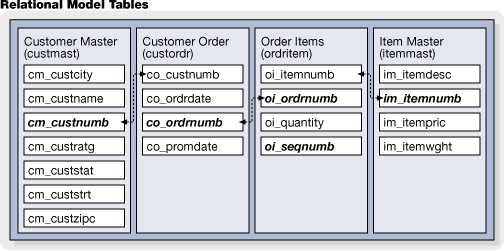<faircom>\drivers\sql.odbc\tutorials\ODBCTutorial2.c
Now we will build some table/file relationships using the FairCom DB SQL ODBC Interface.
This tutorial will advance the concepts introduced in the first tutorial by expanding the number of tables. We will define key columns/fields and create specific indexes for each table to form a relational model database.
Like all other examples in the c-tree tutorial series, this tutorial simplifies the creation and use of a database into four simple steps: Initialize(), Define(), Manage(), and You’re Done() !
Tutorial #2: Relational Model and Indexing
Here we add a bit more complexity, introducing multiple tables, with related indices in order to form a simple "relational" database simulating an Order Entry system. Here is an overview of what will be created:

Note our simple Main() function:
/*
* main()
*
* The main() function implements the concept of "init, define, manage
* and you're done..."
*/
int main(int argc, char* argv[])
{
Initialize();
Define();
Manage();
Done();
printf("\nPress <ENTER> key to exit . . .\n");
getchar();
return(0);
}
We suggest opening the source code with your own editor.
Continue now to review these four steps.